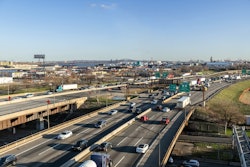A federal judge on Monday indefinitely extended a temporary restraining order that exempts trucking from compliance with the new California law that effectively forced carriers to stop contracting with owner-operators and small fleets.
Following “two hours of spirited debate,” said Joe Rajkovacz, head of government affairs for the Western States Trucking Association, Judge Roger Benitez of the U.S. District Court in Southern California extended the temporary stay of enforcement of the law as it relates to trucking until he decides whether to issue a permanent injunction.
The law, A.B. 5, took effect Jan. 1. Benitez issued the restraining order against its enforcement on motor carriers and owner-operators Dec. 31, just before the law took effect. Late last year, as A.B. 5’s effective date loomed, some major fleets announced intentions to stop contracting with any California-based owner-operators, offering them the opportunity to move out of state or, in some cases, transition to being a company driver. Those moves followed the well-documented beginning of flight by some carriers from the traditional owner-operator-lessee model.
For now, though, “A.B. 5 does not apply to trucking in California or nationally” after Benitez’s ruling, Rajkovacz says. Rajkovacz attended the hearing in San Diego this morning. The California Trucking Association and its legal team (which also represents two independent owner-operators in the case against A.B. 5) gave oral arguments, as did the state of California and the Teamsters, who intervened in the lawsuit on behalf of California and A.B. 5.

A larger decision awaits in the case. Benitez will decide whether to provide a permanent injunction against A.B. 5 while CTA’s lawsuit against the legislation makes its way through federal courts, or whether to allow the law to take effect while the lawsuit plays out.
Benitez did not say when he intends to issue that ruling, Rajkovacz says.
Attorney Jason Geller, managing partner at law firm Fisher Phillips’ San Francisco office, says he expects Benitez to rule within weeks on whether to issue a permanent injunction, based on the quick hearing schedule and the impact that an enforced A.B. 5 would have on the trucking industry. “I’d be surprised if there wasn’t a ruling by month’s end,” he said.
Small fleet owner-operator Jimmy Nevarez, with his authority as Angus Transportation and with two California-based independent contractors leased to him, was among many California truckers awaiting Benitez’s ruling.
He was also one of many considering relocation in the wake of A.B. 5. Nevarez said he was eyeing neighboring Nevada, to which he hauls regularly, as a place to relocate his business in advance of the law.
Today, on the day of the hearing, though, he was busy hauling and checking his news feed repeatedly for any update from the court hearing.
“I’m biting my nails this morning,” he said. “It’s been looking good with all of the outcomes over the past few weeks. We might be in for a treat if the judges see eye to eye with the trucking industry and the economic impacts. I’m waiting intently.”
What he hopes is that, as with much of the construction industry, trucking is allowed to remain under the standard of what’s known as the Borello test, a much more nuanced, complicated variant of the independent contractor test than the three-prong, one-strike-you’re-out ABC test.
“We had no problem complying with [Borello],” given the two contracting owner-ops with Angus Transportation are in a clear business-to-business relationship with Nevarez’s company and with plenty control of their schedules and operations. “My contractors are S Corps and they own equipment” and operate largely free of direction. “They’re legitimate contractors,” Nevarez said.
Most of the issues with the ABC test stem from the B portion of the test, which has been interpreted as requiring any independent contractor to be outside of the principal business of the contracting entity. “It makes no sense that we can’t contract with people in the same industry as us,” Nevarez said. He has been heartened by late developments that seemed to point toward a positive outcome for existing contractor relationships like those he has with his contractors, particularly given his choice to remain within California with his contractors and hope for the best from court judgments.
When Nevarez heard of the last temporary injunction against A.B. 5 enforcement in trucking, “I knew my choices were not all for naught.”
Benitez’s ruling wasn’t the only knock against A.B. 5 of late. A California state court last week ruled that federal law supersedes A.B. 5 and, thus, the law shouldn’t apply to trucking companies. However, state court rulings on the issue likely will be superseded by multiple federal cases against A.B. 5.











